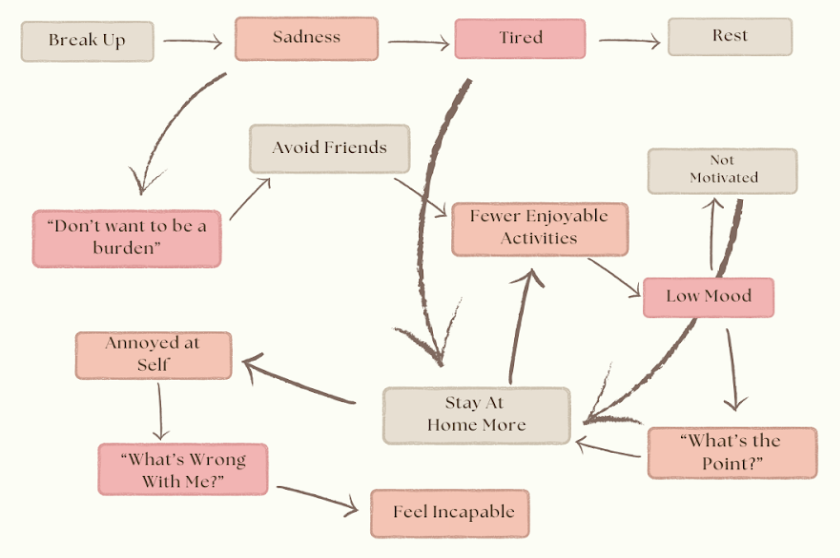Outpatient psychotherapy at Pivot Behavioral Health typically follows the following path: (1) case formulation, (2) treatment planning, and (3) skill building. See below for more details.
- Case Formulation -
We will start by establishing a mental or behavioral health diagnosis that necessitates treatment and getting an understanding of how specific patterns of thinking, feeling, acting, and attending interact within context to maintain your difficulties. Although your history is important to understand, the focus is on the immediate situations and responses that create and sustain psychological problems.

- Treatment Planning -
We will collaborate to identify treatment goals and specific evidenced-based techniques to help you along the way. There are a number of core clinical change processes, each with various techniques that you can practice. Below is a list of these core processes. Click on them for a definition. Your plan may be updated as treatment goes on.
Contingency Management
Changing, or simply noticing, the outcomes of a particular behavior to either increase or decrease the behavior.
Stimulus Control
Changing associations with the environment to increase or decrease the likelihood of a behavior occuring or not.
Successive Approximation
Also known as shaping, is about reinforcing intermediate actions that are en route to a final target behavior.
Prolonged Exposure
Coming in contact with fearful objects or situations, such as cars, spiders, and images, over and over until it is inhibited.
Behavioral Activation
Curbing avoidance that limits engagement in life and replace this with more meaningful activities.
Cognitive Reappraisal
Changing biased thinking by thinking in ways that are more consistent with all of the evidence presented.
Belief Modification
Identifying and changing the beliefs that we have learned but that are inflexible and limit meaningful activities.
Problem Solving
Clearly defining the problem, identifying and making steps toward solving the problem, and resolving any barriers.
Experiential Acceptance
Allowing uncontrollable things be present without trying to get rid of them, including pain and uncertainty.
Mindful Awareness
Attending to whatever shows up in the present-moment in a non-judgemental and curious way, including thoughts.
Arousal Reduction
Reducing physiological distress with various relaxation activities, such as progressive muscle relaxation.
Emotion Regulation
Identifying emotions, learning what they mean, and effectively addressing the problems that elicit them.
Interpersonal Effectiveness
Effectively communicating, through verbal and nonverbal means, our intentions and desires to others.
Motivational Enhancement
Identifying, and sometimes visualizing, reasons for staying the same and reasons for making a change in a curious way.
Values Clarification
Identifying what is truely important in life, how one wants to be in this world, and how one wants to treat others.
Cognitive Defusion
Noticing thoughts and the process of thinking without attaching oneself to the content or meaning of the thoughts.
Self-Management
Keeping track of your problems and evaluating how effective solutions are at solving these problems.
Crisis Management
Developing and implementing a safety plan against self-harm and suicide - identify triggers, coping skills, and support system.
Attention Training
Deliberately shifting attention away from biased information in the environment so as to notice information that is typically lost.
Homeostatic Regulation
Doing activities to facilitate your bodies normal physiological functions, such as eating, sleeping, and exercising regularly.
- Skill Building -
During this phase, you will increase awareness around your automatic patterns and actively make changes, however small or slow-going. Specific skills will be offered and practiced in and between appointments in order to change the old and bring in the new. We will monitor your progress and change course if needed, for example, re-examine your case formulation or treatment plan.
- Get Started -
Schedule a 15-minute phone consultation to see if we are a good fit.
Schedule a Consultation